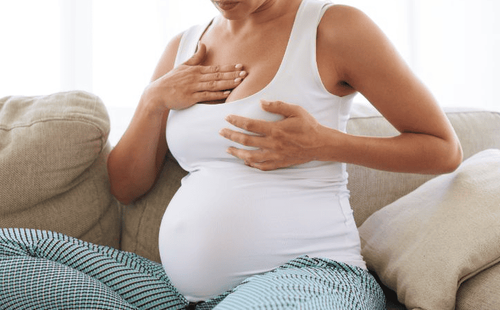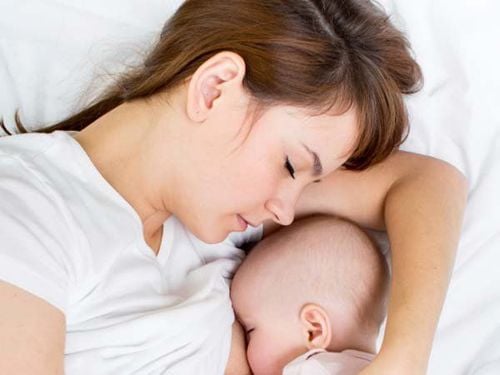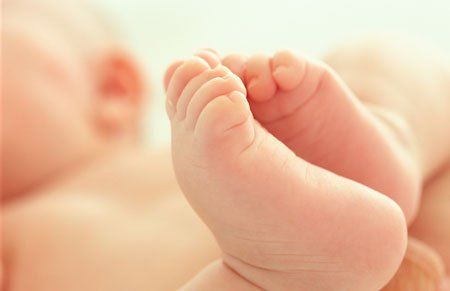This is an automatically translated article.
This article was professionally consulted by resident Doctor Ho Thi Hong Tho - Neonatologist - Department of Pediatrics - Neonatology - Vinmec Phu Quoc International General Hospital.In addition to strong communication and maybe only crying, babies at this stage are also beginning to recognize humor and respond with laughter. Your baby will burst out laughing when he suddenly sees your face when you play peek-a-boo with him or sees a spring toy pop out of a box. You should create activities that encourage children, this will help them improve their cognitive and language development.
1. 19-week-old baby milestones
Have you noticed that your child's hair is starting to fall out and leaving behind more sparse hair spots than usual? This hair loss condition is known as “telogen effluvium”. It usually occurs within the first six months of an infant's life. Whether a baby is born with thick hair or not, most babies lose their old hair and start growing new hairBut why do babies lose their hair ? This could be explained: newborns experience a drop in hormone levels soon after birth (similar to mothers, will also lose some of their hair). You may notice hair loss around certain areas of the head compared to others. And this is often the result of your baby sleeping less and the length of time they spend on their backs.
Is he putting everything in his mouth at the moment? Babies this age are going through a variety of developmental changes that can lead to more thumb sucking and mouth exploration. One of the biggest triggers of this action is when your baby starts teething.
Have you noticed any signs of teething? That's around the time your baby's gums crack for the first time and teeth begin to emerge. Teething can be a difficult period for many babies, but for others, the process is quite easy. But don't worry too much, usually we will have some natural remedies to make the baby's teething process more favorable.
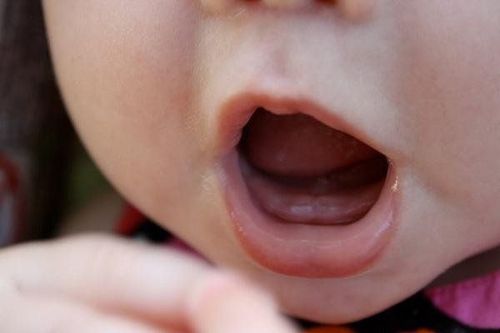
2. Motor development of the 19-week infant
At this age, babies love playtime, and games are a big boost in their motor development, especially those that involve grasping and holding. These are activities that help them practice fine motor skills. Try tossing a small softball in your lap, then see if he can find it and he'll try to do the same. Or you can core an empty spool of thread and hang it in front of your baby, who will probably grab it. Show your baby how to use toys that he hasn't fully developed yet, such as stacking rings or arranging shapes.Of course, for your baby, each game is a learning experience. Researchers at the University of Washington in Seattle found that children who regularly play with blocks perform better on language tests than children who don't play with blocks. play this. Simple theory: Simple games encourage parent-baby bonding and reduce time spent watching TV or other non-baby related activities. They also help with your baby's brain development, encouraging your baby to take new leaps. This is a process that helps the baby develop.
Your baby may approach games with the aim of impressing or attracting, you may notice that he furrows his brows and looks like he is highly concentrated. All this fun is incredibly hard work for a 4- or 5-month-old, so if your baby is starting to get cranky, it could be a sign that he needs a break.
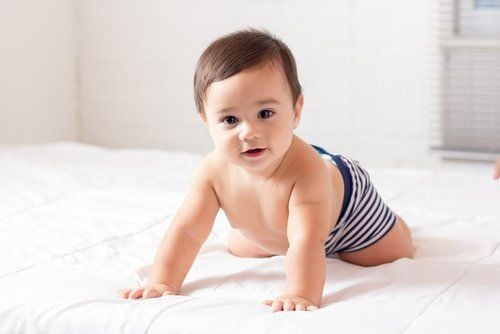
3. Hearing test for babies 19 weeks old
Studies show that 19-week-old babies recognize their own name, and they prefer to hear it over other sounds. Now, your baby is also an expert at watching you, and she will often turn her head when she hears your voice. Some babies take longer with these skills than others, but if your baby doesn't seem to respond to your voice or doesn't start babbling over the next month or so, that's a problem. Your baby's hearing problems can be affected by a number of factorsWhen an infant has a hearing problem at 19 weeks, he or she may still be startled by loud noises (this is a hearing test). infant senses) but they may have difficulty hearing low tones, understanding some voice sounds, or imitating the sounds that make up speech. If you have any concerns, take your baby to the pediatrician for a hearing test. Your doctor will use an otoscope to check your baby for physical problems, such as a ruptured eardrum, or switch to one of two screening tests for young children for hearing loss:
Brainstem response test hearing aid (ABR) uses electrodes to measure how your baby's auditory nerves respond to sounds. The otoacoustic emission test (OAE) uses a microphone to measure the echoes of sounds in your baby's ear canal. No echo indicates hearing loss. If your baby has hearing loss, treatments may include surgery for structural problems, ear canals to help fix repeated ear infections, or voice therapy. speak. But doctors will agree that starting treatment 6 months in advance is best, so consult your pediatrician early if you're concerned. .
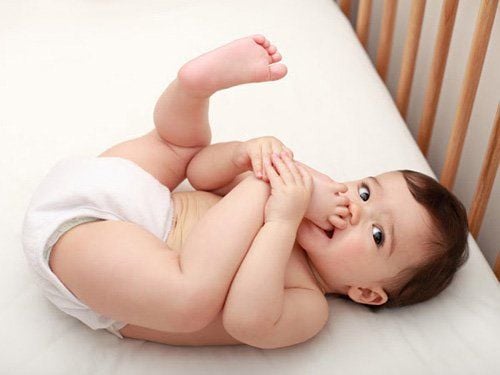
4. Changes in 19-week-old baby's sleeping habits
Ideally, your baby is now sleeping long and able to sleep through the night. Looks like we're going according to the schedule we wanted. If your child still wakes up one or more times a night, you may want to consider this and get it checked out. Reasons that could help explain babies waking up many times during the night could be pain, hunger, etc., but this difference will vary in degree between babies.When a child shows abnormal signs of health, parents can take the child to Vinmec Health system for timely examination and treatment.
As a key area of Vinmec Health System, Pediatrics Department - Vinmec International General Hospital always brings satisfaction to customers and is highly appreciated by industry experts thanks to the following advantages:
gathers a team of leading doctors and doctors in Pediatrics: including leading experts, with high professional qualifications (professors, associate professors, doctorates, masters), experienced, having worked in different hospitals. big hospitals like Bach Mai, 108.. The doctors are all well-trained, professional, have a heart - reach, understand young psychology. In addition to domestic pediatric specialists, the Department of Pediatrics also has the participation of foreign experts (Japan, Singapore, Australia, USA) who are always pioneers in applying the latest and most effective treatment regimens. . Comprehensive services: In the field of Pediatrics, Vinmec provides a series of continuous medical examination and treatment services from Newborn to Pediatric and Vaccine,... according to international standards to help parents take care of their baby's health from birth to childhood. from birth to adulthood Specialized techniques: Vinmec has successfully deployed many specialized techniques to make the treatment of difficult diseases in Pediatrics more effective: neurosurgery - skull surgery, stem cell transplantation. blood in cancer treatment. Professional care: In addition to understanding children's psychology, Vinmec also pays special attention to the children's play space, helping them to have fun and get used to the hospital's environment, cooperate in treatment, improve the efficiency of medical treatment.
Please dial HOTLINE for more information or register for an appointment HERE. Download MyVinmec app to make appointments faster and to manage your bookings easily.
Reference source: parents.com; motherandbaby.co.ukMORE:
Psychological characteristics and disorders due to psychological etiology in young children at the age of holding Children Psychological characteristics of children aged 1 - 6 years Breastfeeding is good for both How are the mother and the baby?






